Erstellt am: 9. 7. 2011 - 00:40 Uhr
A country is born
It is a day of celebration across the country: a Declaration of Independence, a flag-raising ceremony and a parade in the capital city of Juba, attended by community, religious and government leaders from all around the country, as well as 30 heads of state from Africa and other international dignitaries. There will be locally-planned celebrations in villages around the country to herald the birth of the new nation. It will be a day that people have fought for and anticipated for a long time. Decades of civil war between north and south Sudan ended in 2005 with the Comprehensive Peace Agreement. It will be the day that nearly 99 percent of people in Southern Sudan voted for in a referendum in January.
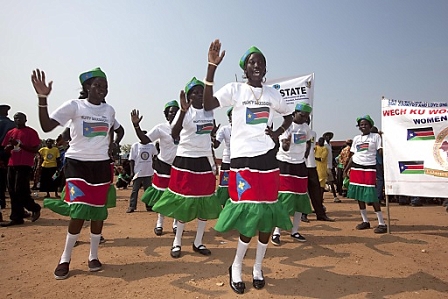
apa
It is a time of great hope for the people of what will be known as the Republic of South Sudan, or simply South Sudan. Through the organization Licht für die Welt I made contact with Ali yousif Ngor. Ali is from Upper Nile State, which is on the border with northern Sudan. He’s an optometrist by profession and is the eye-care coordinator for Licht für die Welt and its sister organization in the Netherlands . He told me the civil war had left its mark on his family and he will never forget the moment “when we got the news that our elder brother has sacrificed his life for our freedom, because he was among the fighters for freedom”. Now Ali is looking forward to the future and a “peaceful country where all rights are respected, with freedom liberty and prosperity, good health and development.”
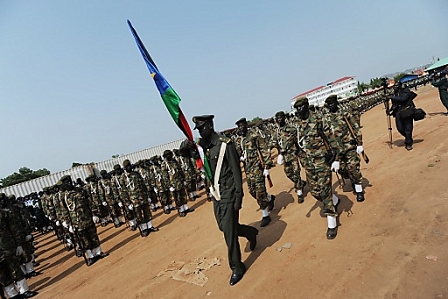
apa
Amidst the celebration and hope, this is also a time of uncertainty about what the future will bring. Ali tells me his greatest fear is “unexpected war, which could suddenly occur, as the north is not happy that the southerners are going”. Recent fighting near the border between northern and southern Sudan has indeed raised fears of a return to civil war. Tensions have flared recently in South Kordofan, an oil-producing state that will be home to much of South Sudan's future oil wealth after secession. The northern Sudanese military has been fighting southern-aligned armed groups.
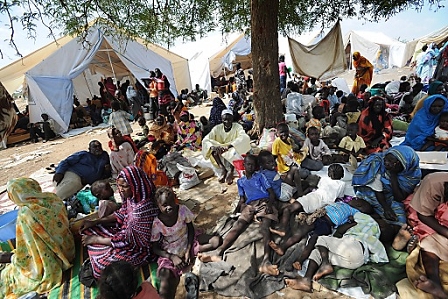
apa
There is also violence within southern Sudan’s borders. According to a U.N. official, some 1,400 civilians have been killed in southern Sudan this year, many by ill-disciplined former rebels incorporated into the security forces. Deputy High Commissioner for Human Rights Kyung-wha Kang said that to halt such mayhem it is vital for the police and army of the new state to be trained and for their work to be observed by human rights monitors. Yet while the international media latch on to such headlines, the southern Sudanese are quietly getting on with the job of trying to run their new country. Many people face an uncertain future: having spent most of their lives as soldiers, many young men are traumatized by war, while having little or no education and therefore minimal prospects on the job market.
FM4’s David Kriegleder was in southern Sudan to find out more about this soon-to-be new country, and met up with Ian Matthew Scholt, the spokesman for South Sudan's Ruling Party, the SPLM. Scholt told him he’s convinced that with the right approach and education programmes, progress can be made: “as a ruling party we have a strategy of how we would like the new country to look like. Trauma is not a simple thing for a country that has been in war for all these years. But if the government goes ahead with development … educational curricula, most of these problems will not be there.”
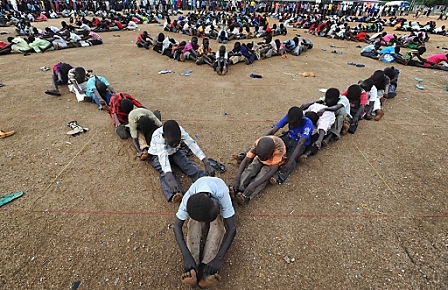
apa
James Shikwati is the director of the Kenyan-based Inter Region Economic Network which advocates a free market approach for the development of Africa. He told David Kriegleder that it’s vital to have strong structures and a clear rule of law mechanism, and if South Sudan can’t achieve that, it will resemble many other countries in Africa: “There's going to be a lot of money, but this money will be remaining at the top - at the government level … the majority of the people will remain poor. And in the long run that will create instability”. But Shikwati also sees an opportunity for South Sudan to do things differently: “Southern Sudan can say ‘we are going to be a different country - because we don't want to make the mistakes our neighbours have been making’.”
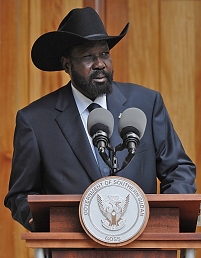
apa
Salva Kiir has a reputation as the quiet man of Sudanese politics, described as a “wily operator” with an eccentric taste in cowboy hats. He is the president who has the job of steering this region into full statehood.
One of the many challenges facing president Kiir is the country’s severe poverty. In some parts of the country 1 in 10 babies born dies before its first birthday. On average, fewer than five percent of children complete primary school. In most of the country less than 5 percent of the population have access to improved water and sanitation. So there’s bound to be dependence on NGOs. But this can be a double-edged sword. James Shikwati says no-one disputes the value of NGOs in helping to save lives, but “the long-run aspect of it is that the NGO needs to sustain itself in business and therefore may not come up with a workable solution that can make people take charge of their lives. So there's an inbuilt interest within the NGO mechanism to sustain itself”. Another downside of aid is that it gets in the way of self-sufficiency: “it kills that ability to produce - and makes people know that an aeroplane will always land with some money", says Shikwati.
Today all the challenges and fears will be put to one side as the birth of a new country is celebrated. Ali yousif Ngor told me he will be at the ceremony in Juba, and that he’s very excited at the prospect of seeing “our flag being raised for our freedom”.


